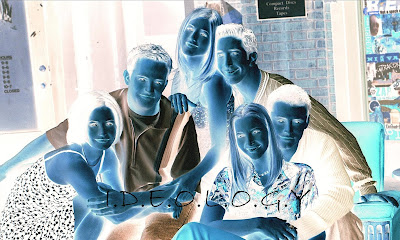Companion to my Article on Friends
Friends and the Universal: The Case of Skins
In an episode
of the British television dramedy Skins, the show’s protagonists
encounter a young Russian woman whom they assume would not speak or
understand English. The woman then surprises the show’s protagonists and
audiences that she speaks fluent, colloquial, American punctuated with local
pop American references; having learned from “like, the best American show
ever” (i.e. Friends). As a running gag throughout the rest of the
episode, the woman speaks in the manner that characterises Friends' characters and repeats recognizable catch phrases from the show (including
the famous “we were on a break” when it turns out that she was married which
did not deter her from having an affair with one of the protagonists).
Although the referencing of Friends in Skins is at times exaggerated and drawn out for laughs, it offers a clear representation for the show’s universal reach; it is especially telling that the episode does not mention Friends once. And yet the episode’s audiences can easily connect the references to the show, turning the catch-phrases from Friends into a familiar and universal language. It is also telling that the language of an American television show can become part of the communication between a British show and its international audiences- including its Arab audience, as the case is with the person writing these lines.
The universal language of Friends is not always so banal, light-hearted, and innocent.
Friends and the Terrorist: The Case of Ahmed and Salim
Israeli popular media used Friends to speak the
universalized language of racist counterterrorism. In the third episode of
the racist Israeli cartoon Ahmed and Salim, we see Salim, the son of
the Palestinian terrorist Yasser, bemoaning the fact of not having friends on
facebook. Taunted by his older brother Ahmed for his lack of friends, he
spirals into self-loathe and proclaims he wants to kill himself. The talk of suicide excites the father, Yasser, who proceeds by telling Salim, in a mixture of gibberish, English, Hebrew, and Arabic, that instead of killing himself like
an “Elton John” ("homo", as the subtitles proclaim) he could instead blow
himself up amidst “American infidels”.
Convinced, Salim walks into Central Perk where the characters of Friends are having
coffee. Rachel proceeds to comfort the young terrorist and explain
to him the
true meaning and value of friendship. Yasser is then disappointed to see his
son was not only convinced not to proceed with his suicide mission but also to
leave his explosive belt in the mosque, unwittingly blowing it up. The characters
of Friends finally appear by the side of Yasser to assuage his anger, and the
episode ends with Yasser screaming the names of the shows characters in
contempt.
The white circle of Friends becomes the other of terror, and, consistent with the shows global and ideological appeal, this circle becomes capable of appealing to a newer generation of Arabs (especially that throughout the show Salim, unlike his father Yasser, is presented as a hesitant terrorist who would turn otherwise if not parented by the terrorist Yasser) against the traditional, hateful, and inwards-looking ways of their parents.
Side note: The resistance of the older generation of Arabs-cum-terrorists to the Friends appeal, as per the Israeli cartoon, creates a dichotomy where you either heed the call of Friends (or of the American sit com, the American mainstream culture more broadly) or be considered a terrorist; though, to be fair to the cartoon's racist creator, he recognizes the annoying quality of the characters of Friends and seems to endow the terrorist as a racist stereotype with more comical potential than the characters of Friends combined.
The episode does not only build on the show’s global appeal
but also the illusion of familiarity that makes audiences worldwide (including
young Arabs/terrorists-to-be) to turn to the show’s protagonists for guidance
and comfort. The one discordant details, however, is the display of compassion
the characters show towards Salim; this display is neither tainted by the
egoistic individualism that characterizes the show’s characters nor the racism
that dominates their world.
To know why I say so, read the actual article :)



Comments
Post a Comment